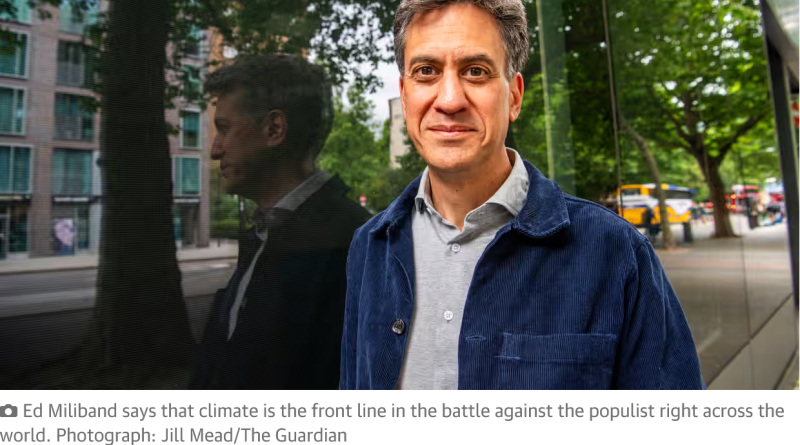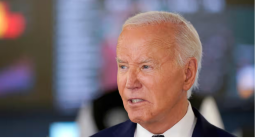Labour will take global lead on climate action, Ed Miliband vows

Labour will promise to take the lead on global efforts to tackle the climate crisis, filling a “vacuum of leadership” on the world stage and proving Rishi Sunak’s U-turn on net zero has been a “historic mistake”, Ed Miliband has said.
The shadow energy security and net zero secretary said the UK needed to change course and was “off track”.
Labour drew widespread criticism earlier this year from economists, industrial leaders and environmental campaigners when it cut its green investment plans by half, rolling back on a pledge to spend £28bn equipping the economy to reach its climate target.
It has also been locked in combat with the Tories over the costs and benefits of a green transition and has given way in certain key areas. Miliband has pledged to stick with the Tories’ decision to scrap a ban on gas boiler sales from 2035.
But Miliband says his party would put climate front and centre of its plans in government, promising to reverse the ban on onshore wind in the immediate days after parliament returns after the election.
He said it was also a chance to fundamentally change course on climate and to make that case on the world stage.
“We have taken the manifesto position we have because we think it is the right thing now,” he said in an interview with the Guardian. “But it is also right that we fill the vacuum of leadership on this issue.
“We now have a government that is explicitly going along with the climate delayers. We have to change course as a country and as a world. And this election is an opportunity for us to change course.”
Miliband is to become one of the most influential figures in the expected next Labour government and one of very few with direct cabinet experience. He said that climate was the front line in the battle against the populist right across the world.
“If we win, we will seize the moment,” he said. “There is not a minute to waste in the drive for 2030 clean power and in the drive for climate action. The world is off track, Britain is off track and we intend to change that direction.”
There is a growing awareness within Labour of the scale of the party’s task internationally in the coming years, with the potential loss of progressive allies on climate issues in governments such as France, Canada and the US.
The former party leader said a Labour government would take on that mantle of climate leadership, should it win the election. “You only get to lead internationally if you set the right example at home,” he said.
“If we win the election, it will send a message round the world that the approach we are taking on clean energy, our argument on bills, independence, jobs and future generations, you can win an election on that argument.”
Labour has avoided getting into direct conflict with the Green party, which is outflanking Labour on most climate pledges and targeting seats against Labour in Bristol Central and in Brighton Pavillion.
But Miliband said his experience from the 2015 election taught him not to believe the polls – and that in seats with wafer-thin majorities a vote for small parties would risk allowing the Conservatives back in. “Do not vote Green and wake up with a Tory government,” he said.
And he also said he would not defend the actions of climate protesters like Just Stop Oil, accusing them of being part of breaking the consensus on climate and being “deeply counterproductive”.
Though there was a right to peaceful protest, he said, “I think all the evidence is that it turns people off the cause.”
Miliband said there had been huge damage done by the Conservatives to the climate consensus in Britain since the UK hosted Cop26 in Glasgow in 2021. Net zero has been a major battleground on the right and Sunak announced a dilution of green policies last autumn including moving back the ban on the sale of new petrol and diesel cars.
Miliband said voters could chose to give their endorsement to tackling climate action on Thursday. “This is a moment to show that the Conservative party and Rishi Sunak made a historic mistake by trying to break the climate consensus in this country,” he said.
“This is the most important climate election in history – we are halfway through the decisive decade. The next government will serve for most of the rest of this decade. This is the biggest choice in our history on this,” he said.
In February, Labour cut its green investment plans by half and pledged only £15bn a year for its green prosperity plan – only a third of which would be new money.
The U-turn dismayed many business leaders and green campaigners, who said that without green investment on a larger scale the UK faced steep decline as a result of crumbling infrastructure and that energy targets would be difficult to hit.
Jürgen Maier, the former UK head of Siemens, the German industrial giant and major investor, said massive investment was needed to rebuild the UK economy and make it fit for the future.
Before the cut was announced he warned: “These are the growth areas of the future. The £28bn is not a cost, it’s an investment. If you make this investment, business will return to the UK.”
At the time Areeba Hamid, the co-executive director of Greenpeace UK, said the Labour leader, Keir Starmer, had “caved like a house of cards in the wind”.
Emma Pinchbeck, the chief executive of Energy UK, the trade association for the energy industry, said the issue was less the actual sum spent than “the signal it sends”.
Speaking after the cut, she said: “The party has been engaging constructively with business over recent months, but retaining the confidence of the market is dependent on not making U-turns that damage the UK’s investability.”
But Miliband insisted it remained the “most ambitious plan for climate and energy in our national history” and said the party was committed to clean power by 2030, no new oil and gas licences, a warm homes plan and a national wealth fund to rebuild industrial heartlands.
“We are seeking a mandate in this election for that agenda, it’s a mandate for economic change and it’s a mandate to tackle climate change,” he said.
“We will make the modern, progressive, big tent case for climate action which does the right thing now. Rishi Sunak may have departed the pitch but I don’t think the British public have.”
Research by More in Common has suggest Labour’s plan for Great British Energy is one of the main public cut-through policies – along with the Tories’ plans for national service.
While there have been concerns the project would be merely an investment vehicle akin to George Osborne’s Green Investment Bank, Miliband said it would be a generator of clean energy.
“It speaks to the sense we should own and invest in our own infrastructure,” he said. “And it speaks to a sense of a loss of control that we saw in the two years of our cost of living crisis that we have no control over fossil fuel markets governed by dictators like Putin.”
Miliband said that the Tory narrative on the cost of net zero could be disproved by the action Labour would take to cut bills.
“The truth is that we can beat the political right, the anti-climate right on this,” he said.
“Take the onshore wind ban: the Resolution Foundation has shown that the ban hits the poorest six times harder than the rich. Their opposition to clean energy is driving up poverty and energy bills.”





